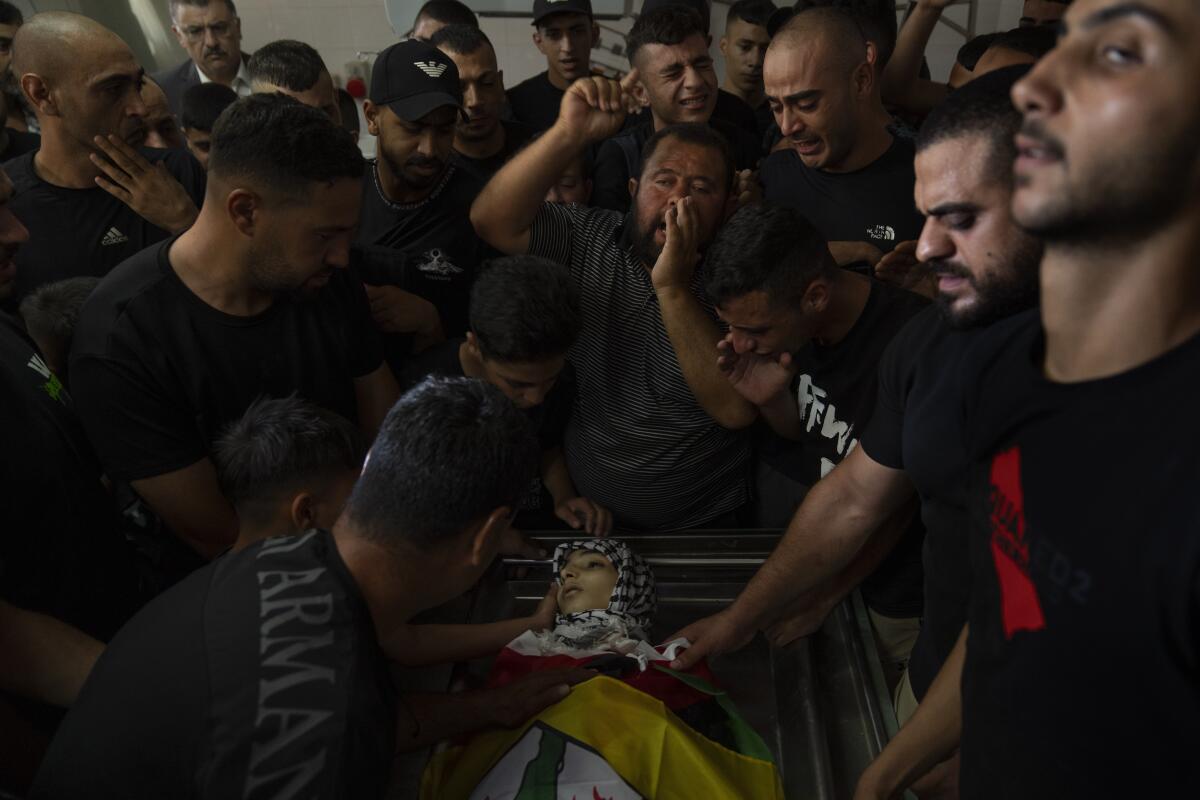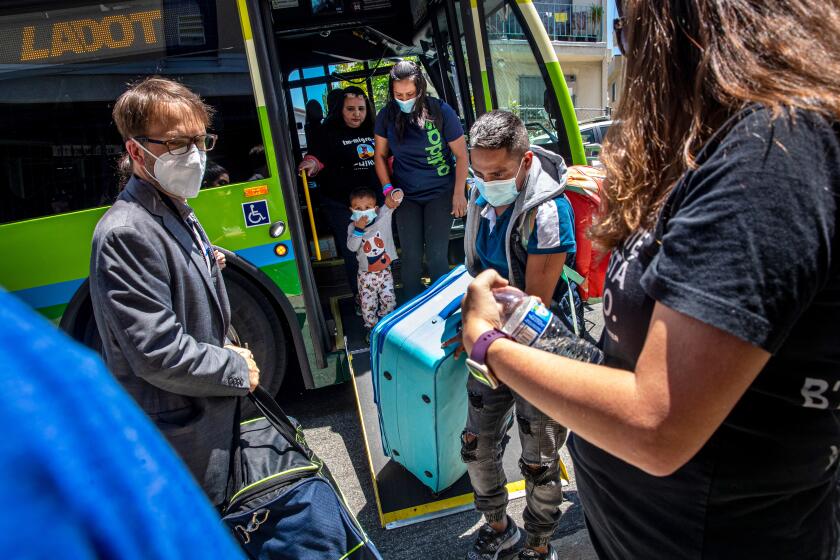Israeli army kills 14-year-old Palestinian as an Israeli minister visits a flashpoint holy site

- Share via
JERUSALEM — The Israeli military killed a 14-year-old Palestinian boy in the occupied West Bank on Thursday, Palestinian health officials said, as an ultranationalist Israeli Cabinet minister visited a sensitive Jerusalem holy site that has been a flashpoint for violence between Israel and the Palestinians.
The visit by Israeli National Security Minister Itamar Ben-Gvir to the disputed hilltop compound comes during a period of heightened Israeli-Palestinian violence in the West Bank for the past year and a half and threatens to inflame already surging tensions.
It also prompted the Hamas militant group to announce the launch of a rare rocket from the West Bank and drew condemnation from across the Muslim world.
The site is revered by Jews and Muslims, and the competing claims lie at the heart of the Israeli-Palestinian conflict.
Early Thursday, the Palestinian Health Ministry said 14-year-old Fares Abu Samra was killed by Israeli forces in the West Bank town of Qalqilya. The Israeli military said Palestinians threw rocks and firebombs at troops, who responded by firing into the air. It said the incident was being reviewed.
Residents of Qalqilya accused the Israeli military of opening fire toward civilians after storming into the town to arrest a Palestinian. Fares’ father, Sharhabeel Abu Samra, a Palestinian security officer, claimed his son was walking in the street and “not doing anything,” when Israeli soldiers shot at him and then hit him with their jeep.
“Where are the human rights?” he said, crying.
A group of 36 asylum seekers arrived in Los Angeles on Thursday morning after a 25-hour bus ride from Texas.
Ben-Gvir joined hundreds of Jews visiting the Al-Aqsa Mosque compound — the location in antiquity of two biblical Jewish temples — to mark the Jewish holiday of Tisha B’Av. During the day of mourning and repentance, Jews reflect on the destruction of the First and Second Temples, pivotal events in Jewish history.
The Waqf, an Islamic trust that runs civil matters at the mosque, said that 2,240 Jews had entered the compound for the holiday — the highest number recorded in five years.
“This is the most important place for the people of Israel which we must return to and show our rule,” Ben-Gvir said in a video released by his office, with the golden Dome of the Rock in the background.
The Palestinian Authority’s Jerusalem Affairs Ministry warned that the government and extremists like Ben-Gvir would “push things toward religious war” by provoking Muslims worldwide. The Palestinian Ministry of Foreign Affairs said it considered Ben-Gvir’s visit an attempt to impose Israeli sovereignty over the site.
Neighboring Jordan, which acts as a custodian over the site and has a peace agreement with Israel, said such visits “threaten to trigger new cycles of violence.” Saudi Arabia, the custodian of Islam’s two holiest cities and a country with which Israel hopes to normalize ties, denounced the visit as “a provocation of the feelings of Muslims around the world.” Turkey demanded that Israeli authorities “restrain these provocations.”
Waqf officials said crowds of Jewish visitors danced, whistled and sang the Israeli national anthem as they streamed through the compound.
“The government is giving cover to these extremists,” said Bassam Abu Labda, a Waqf official. “This is very dangerous.”
Ben-Gvir, a former West Bank settler leader and far-right activist who years ago was convicted of incitement and supporting a Jewish terror group, now oversees the country’s police force.
Thursday was Ben-Gvir’s third public visit to the contested site since joining Prime Minister Benjamin Netanyahu’s far-right government. The site, known to Jews as the Temple Mount, is the holiest site in Judaism. Today, it is home to the Al-Aqsa Mosque, the third-holiest site in Islam.
Police said they had arrested 16 people for violating “visitation regulations” at the site. Under longstanding arrangements, Jews are permitted to visit the site, but not to pray there. But in recent years, a growing number of Jewish visitors have begun to quietly pray, raising fears among Palestinians that Israel is plotting to divide or take over the site. Ben-Gvir has long called for increased Jewish access.
As Palestinian anger rose over Ben-Gvir’s visit, the Hamas military wing in the West Bank released a video purporting to show militants in the northern city of Jenin firing a rocket toward northern Jewish settlements across Israel’s separation barrier. The group identified the rocket as a Qassam-1, a primitive and notoriously inaccurate type of rocket with a range of some 2.5 miles.
The Israeli military said it had found remains of an improvised rocket near the Palestinian village of Silat al-Harithiya, just northwest of Jenin. While Hamas’ military wing launches hundreds of rockets from the Hamas-run Gaza Strip during skirmishes with Israel, rocket fire from the West Bank remains rare. But last month, Palestinian militants similarly attempted to fire rockets into Israeli settlements from Jenin, which also fell short.
Since early last year, Israel has been staging near-nightly raids into Palestinian areas that it says are meant to stamp out militancy and thwart future attacks. More than 160 Palestinians have been killed in the fighting this year, according to a tally by the Associated Press. At least five of them, including the boy killed Thursday, were age 14 or younger.
The military says most of those killed have been militants. But stone-throwing youths protesting the incursions and others not involved in the confrontations have also been killed. At least 26 people have been killed in Palestinian attacks against Israelis since the start of 2023.
Israel captured east Jerusalem, where the holy compound lies, along with the West Bank and the Gaza Strip in the 1967 Mideast war. The Palestinians seek those territories for a future independent state, with east Jerusalem as its capital. Israel annexed east Jerusalem in a move unrecognized by most of the international community and considers the city its undivided, permanent capital.
Netanyahu’s government has intensified steps to solidify Israel’s hold on the Palestinian territories, angering Israel’s top ally, the United States, and dimming hopes for Palestinian statehood.
More to Read
Sign up for Essential California
The most important California stories and recommendations in your inbox every morning.
You may occasionally receive promotional content from the Los Angeles Times.










